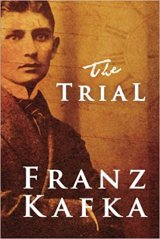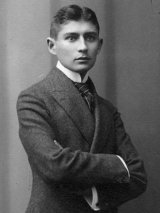The Trial Page #10
The Trial is a novel written by Franz Kafka between 1914 and 1915 and published posthumously on 26 April 1925. One of his best-known works, it tells the story of Josef K., a man arrested and prosecuted by a remote, inaccessible authority, with the nature of his crime revealed neither to him nor to the reader. Heavily influenced by Dostoevsky's Crime and Punishment and The Brothers Karamazov, Kafka even went so far as to call Dostoevsky a blood relative. Like Kafka's other novels, The Trial was never completed, although it does include a chapter which appears to bring the story to an intentionally abrupt ending.
The weather was dull on Sunday. K. was very tired, as he had stayed out drinking until late in the night celebrating with some of the regulars, and he had almost overslept. He dressed hurriedly, without the time to think and assemble the various plans he had worked out during the week. With no breakfast, he rushed to the suburb he had been told about. Oddly enough, although he had little time to look around him, he came across the three bank officials involved in his case, Rabensteiner, Kullich and Kaminer. The first two were travelling in a tram that went across K.'s route, but Kaminer sat on the terrace of a café and leant curiously over the wall as K. came over. All of them seemed to be looking at him, surprised at seeing their superior running; it was a kind of pride that made K. want to go on foot, this was his affair and the idea of any help from strangers, however slight, was repulsive to him, he also wanted to avoid asking for anyone's help because that would initiate them into the affair even if only slightly. And after all, he had no wish at all to humiliate himself before the committee by being too punctual. Anyway, now he was running so that he would get there by nine o'clock if at all possible, even though he had no appointment for this time. He had thought that he would recognise the building from a distance by some kind of sign, without knowing exactly what the sign would look like, or from some particular kind of activity outside the entrance. K. had been told that the building was in Juliusstrasse, but when he stood at the street's entrance it consisted on each side of almost nothing but monotonous, grey constructions, tall blocks of flats occupied by poor people. Now, on a Sunday morning, most of the windows were occupied, men in their shirtsleeves leant out smoking, or carefully and gently held small children on the sills. Other windows were piled up with bedding, above which the dishevelled head of a woman would briefly appear. People called out to each other across the street, one of the calls provoked a loud laugh about K. himself. It was a long street, and spaced evenly along it were small shops below street level, selling various kinds of foodstuffs, which you reached by going down a few steps. Women went in and out of them or stood chatting on the steps. A fruitmonger, taking his goods up to the windows, was just as inattentive as K. and nearly knocked him down with his cart. Just then, a gramophone, which in better parts of town would have been seen as worn out, began to play some murderous tune. K. went further into the street, slowly, as if he had plenty of time now, or as if the examining magistrate were looking at him from one of the windows and therefore knew that K. had found his way there. It was shortly after nine. The building was quite far down the street, it covered so much area it was almost extraordinary, and the gateway in particular was tall and long. It was clearly intended for delivery wagons belonging to the various warehouses all round the yard which were now locked up and carried the names of companies some of which K. knew from his work at the bank. In contrast with his usual habits, he remained standing a while at the entrance to the yard taking in all these external details. Near him, there was a bare-footed man sitting on a crate and reading a newspaper. There were two lads swinging on a hand cart. In front of a pump stood a weak, young girl in a bedjacket who, as the water flowed into her can, looked at K. There was a piece of rope stretched between two windows in a corner of the yard, with some washing hanging on it to dry. A man stood below it calling out instructions to direct the work being done. K. went over to the stairway to get to the room where the hearing was to take place, but then stood still again as besides these steps he could see three other stairway entrances, and there also seemed to be a small passageway at the end of the yard leading into a second yard. It irritated him that he had not been given more precise directions to the room, it meant they were either being especially neglectful with him or especially indifferent, and he decided to make that clear to them very loudly and very unambiguously. In the end he decided to climb up the stairs, his thoughts playing on something that he remembered the policeman, Willem, saying to him; that the court is attracted by the guilt, from which it followed that the courtroom must be on the stairway that K. selected by chance. As he went up he disturbed a large group of children playing on the stairs who looked at him as he stepped through their rows. "Next time I come here," he said to himself, "I must either bring sweets with me to make them like me or a stick to hit them with." Just before he reached the first landing he even had to wait a little while until a ball had finished its movement, two small lads with sly faces like grown-up scoundrels held him by his trouser-legs until it had; if he were to shake them off he would have to hurt them, and he was afraid of what noise they would make by shouting. On the first floor, his search began for real. He still felt unable to ask for the investigating committee, and so he invented a joiner called Lanz - that name occurred to him because the captain, Mrs. Grubach's nephew, was called Lanz - so that he could ask at every flat whether Lanz the joiner lived there and thus obtain a chance to look into the rooms. It turned out, though, that that was mostly possible without further ado, as almost all the doors were left open and the children ran in and out. Most of them were small, one-windowed rooms where they also did the cooking. Many women held babies in one arm and worked at the stove with the other. Half grown girls, who seemed to be dressed in just their pinafores worked hardest running to and fro. In every room, the beds were still in use by people who were ill, or still asleep, or people stretched out on them in their clothes. K. knocked at the flats where the doors were closed and asked whether Lanz the joiner lived there. It was usually a woman who opened the door, heard the enquiry and turned to somebody in the room who would raise himself from the bed. "The gentleman's asking if a joiner called Lanz, lives here." "A joiner, called Lanz?" he would ask from the bed." "That's right," K. would say, although it was clear that the investigating committee was not to be found there, and so his task was at an end. There were many who thought it must be very important for K. to find Lanz the joiner and thought long about it, naming a joiner who was not called Lanz or giving a name that had some vague similarity with Lanz, or they asked neighbours or accompanied K. to a door a long way away where they thought someone of that sort might live in the back part of the building or where someone would be who could advise K. better than they could themselves. K. eventually had to give up asking if he did not want to be led all round from floor to floor in this way. He regretted his initial plan, which had at first seemed so practical to him. As he reached the fifth floor, he decided to give up the search, took his leave of a friendly, young worker who wanted to lead him on still further and went down the stairs. But then the thought of how much time he was wasting made him cross, he went back again and knocked at the first door on the fifth floor. The first thing he saw in the small room was a large clock on the wall which already showed ten o'clock. "Is there a joiner called Lanz who lives here?" he asked. "Pardon?" said a young woman with black, shining eyes who was, at that moment, washing children's underclothes in a bucket. She pointed her wet hand towards the open door of the adjoining room.
Translation
Translate and read this book in other languages:
Select another language:
- - Select -
- 简体中文 (Chinese - Simplified)
- 繁體中文 (Chinese - Traditional)
- Español (Spanish)
- Esperanto (Esperanto)
- 日本語 (Japanese)
- Português (Portuguese)
- Deutsch (German)
- العربية (Arabic)
- Français (French)
- Русский (Russian)
- ಕನ್ನಡ (Kannada)
- 한국어 (Korean)
- עברית (Hebrew)
- Gaeilge (Irish)
- Українська (Ukrainian)
- اردو (Urdu)
- Magyar (Hungarian)
- मानक हिन्दी (Hindi)
- Indonesia (Indonesian)
- Italiano (Italian)
- தமிழ் (Tamil)
- Türkçe (Turkish)
- తెలుగు (Telugu)
- ภาษาไทย (Thai)
- Tiếng Việt (Vietnamese)
- Čeština (Czech)
- Polski (Polish)
- Bahasa Indonesia (Indonesian)
- Românește (Romanian)
- Nederlands (Dutch)
- Ελληνικά (Greek)
- Latinum (Latin)
- Svenska (Swedish)
- Dansk (Danish)
- Suomi (Finnish)
- فارسی (Persian)
- ייִדיש (Yiddish)
- հայերեն (Armenian)
- Norsk (Norwegian)
- English (English)
Citation
Use the citation below to add this book to your bibliography:
Style:MLAChicagoAPA
"The Trial Books." Literature.com. STANDS4 LLC, 2025. Web. 24 Feb. 2025. <https://www.literature.com/book/the_trial_1052>.








Discuss this The Trial book with the community:
Report Comment
We're doing our best to make sure our content is useful, accurate and safe.
If by any chance you spot an inappropriate comment while navigating through our website please use this form to let us know, and we'll take care of it shortly.
Attachment
You need to be logged in to favorite.
Log In